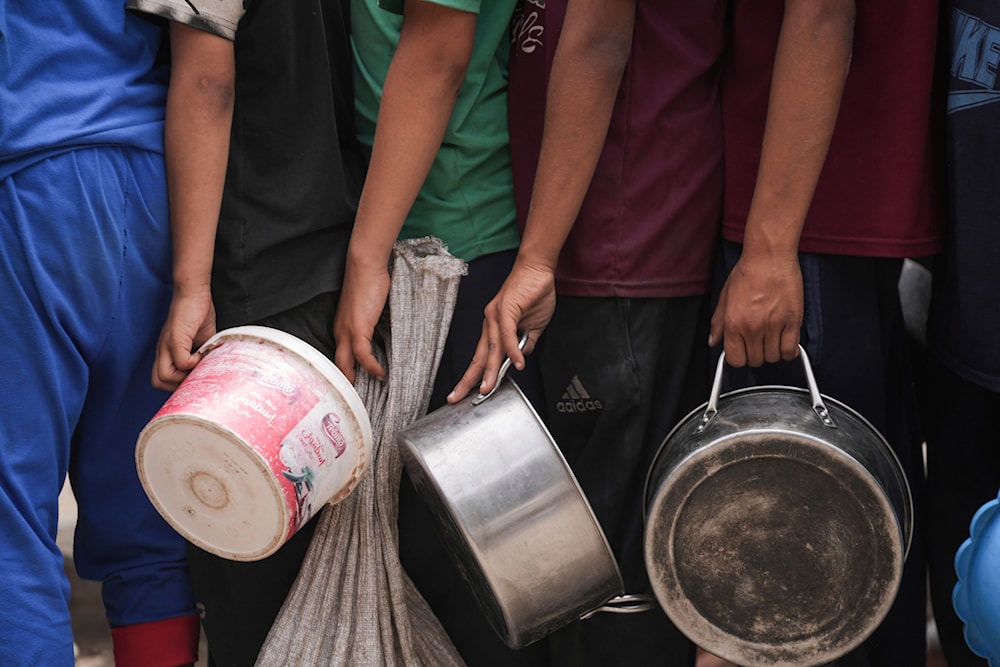Gaza-bound food left to rot in the sun amid Israeli closure of Rafah
A backlog of aid has accumulated on the road between the Egyptian side of the border and the town of al-Arish.
-

Palestinians line up for food distribution in Deir al Balah, the central Gaza Strip, Palestine, May 10, 2024. (AP)
Food supplies awaiting entry into Gaza from Egypt have begun to rot, as the border crossing remains closed by Israeli authorities for the third week now.
Rafah was a major entry route for minimal humanitarian aid and commercial commodities before "Israel" escalated its aggression on May 6, seizing control of the crossing from the Palestinian side.
According to Egyptian authorities and sources, the military aggression continues to jeopardize humanitarian efforts, and "Israel" must return the crossing to Palestinians.
A backlog of aid has accumulated on the road between the Egyptian side of the border and the town of al-Arish, which is roughly 45 kilometers (28 miles) west of Rafah and serves as an entry point for foreign humanitarian deliveries.
A truck driver told Reuters that his products had been on his truck for a month, slowly rotting in the heat. "Apples, bananas, chicken and cheese, a lot of things have gone rotten, some stuff has been returned and is being sold for a quarter of its price," he added.
"I'm sorry to say that the onions we're carrying will at best be eaten by animals because of the worms in them."
According to UN data, no vehicles have traveled via Rafah since May 5, and just a handful have passed through the neighboring Israeli border of Karem Abu Salem crossing.
The number of people awaiting assistance has increased substantially, with some trapped for more than two months, according to Khaled Zayed, head of the Egyptian Red Crescent in the region.
Zayed reported that some items are in need of specific temperatures, expressing hope that the border will reopen "as soon as possible."
Some food was sold at a discount on the local market in northern Sinai, resulting in the confiscation of supplies of rotting eggs, according to local authorities from Egypt's Ministry of Supply.
Inside Gaza, there have been concerns regarding the quality of delayed food supply that arrived before Rafah closed or via other crossings.
Palestinian medical and police personnel who used to inspect items entering Gaza were unable to do so during "Israel's" attack, according to Ismail al-Thawabta, the head of Gaza Government Media Office.
Egypt rejected Israeli proposal for joint coordination to reopen Rafah
Reuters reported on May 16, citing Egyptian sources, that Egypt rejected an Israeli proposal for joint coordination to reopen the Rafah crossing between Egypt's Sinai Peninsula and the Gaza Strip, along with managing its future operation.
Israeli officials from the Shin Bet security service introduced the plan during a visit to Cairo on May 15 amid heightened tensions between the two sides following the recent Israeli aggression on the city of Rafah in southern Gaza and the occupation of the main Rafah crossing with Egypt.
The crossing has historically served as a vital conduit for humanitarian aid entering Gaza and as an exit point for medical evacuees. Egypt insists that the crossing should be managed solely by Palestinian authorities.
Throughout the week, Cairo and Tel Aviv have exchanged accusations regarding the closure of the border crossing and the consequent hindrance of humanitarian aid to the besieged Gaza Strip.
Egypt stressed that the closure of Rafah is solely due to the Israeli military operation, repeatedly cautioning that the Israeli offensive seeks to empty Gaza and forcibly displace Palestinians into the North African country.
ICJ orders 'Israel' to immediately halt offensive on Rafah
In a momentous emergency verdict on South Africa's complaint accusing "Israel" of genocide, judges at the United Nation's highest court, the International Court of Justice (ICJ), ordered "Israel" to immediately halt its military assault on Rafah in southern Gaza on Friday.
The published ICJ filings revealed that South Africa asked the court to order "Israel's" complete withdrawal from Rafah, the "last refuge" for the people of Gaza, as well as the allowance of unrestricted access to UN officials, organizations, journalists, investigators, and humanitarian aid into the Strip.
South Africa reiterated that "Israel" is killing Palestinian civilians while starving them by blocking humanitarian aid deliveries to the Gaza Strip. "Those who have survived so far are facing imminent death now, and an order from the Court is needed to ensure their survival," South Africa said in its filing.
It is worth noting that the ICJ failed to charge "Israel" with genocide but imposed a set of anti-genocide measures the occupation blatantly neglected.

 4 Min Read
4 Min Read










